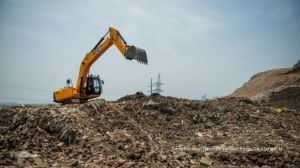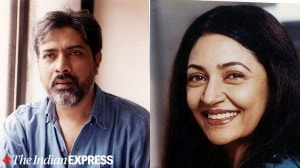Stay updated with the latest - Click here to follow us on Instagram
UN team arrive in Dhaka to discuss modalities of probe over killings of protesters
As per the report, in a media advisory, the UN office in Bangladesh stated that a team from the UN High Commissioner for Human Rights would be visiting Dhaka from 22-29 September.
 Army personnel stand guard in front of Jatrabari Police Station, that was vandalized and set on fire, in Dhaka, Bangladesh, Friday, Aug. 9, 2024. (AP Photo)
Army personnel stand guard in front of Jatrabari Police Station, that was vandalized and set on fire, in Dhaka, Bangladesh, Friday, Aug. 9, 2024. (AP Photo)A UN team led by Rory Mungoven, chief of the Asia Pacific region at the Office of the United Nations High Commissioner for Human Rights, arrived in Dhaka on Thursday to discuss potential assistance in promoting human rights with the interim government, as per a report by Dhaka Tribune newspaper.
“I’m visiting with a small team this week to really hold some preliminary discussions, exploratory discussions with the government about ways in which our office can support the interim government,” Mungoven was quoted as saying by the Bangladesh daily after his meeting with Foreign Secretary Masud Bin Momen.
He stated that the UN is committed to assisting Bangladesh in restoring democracy, renewing institutions, and advancing human rights.
Around 300 people, including many university and college students, lost their lives during protests that erupted in July. Initially, the protests were focused on opposing government job quotas but quickly escalated into broader demonstrations aimed at ousting long-standing former Prime Minister Sheikh Hasina.
An interim government, led by Nobel Peace Prize laureate Muhammad Yunus, was installed after Hasina fled to New Delhi following the student-led uprising.
Eaelier, in a media advisory, the UN office in Bangladesh stated that a team from the UN High Commissioner for Human Rights would be visiting Dhaka from 22-29 September. “The purpose of this visit is to understand their priorities for assistance in promoting human rights,” the advisory was quoted as saying by Reuters, noting that the interim government of Bangladesh had requested the UN to investigate the killings during the protests.
“It is important to note that this visit is not an investigation, but rather it will focus on discussing the process for investigating human rights violations in light of the recent violence and unrest,” the advisory added.
Volker Turk, the UN human rights chief, reportedly called Yunus last week, informing him that a UN-led investigation would be launched “very soon” to look into the deaths of the protesters, according to Yunus’ office. The UN added that a separate fact-finding team would be sent to Dhaka in the coming weeks to carry out the investigation once the details are finalised.
Meanwhile, according to a recent report by the UN Office of the High Commissioner for Human Rights, a staggering 650 people lost their lives in Bangladesh during the student-led protests and subsequent political upheaval between July 16 and August 11. The majority of these deaths, approximately 400, occurred in the weeks leading up to the fall of the Awami League government. Following the regime change on August 5 and 6, an additional 250 people were reported killed, with the number of deaths from revenge attacks still being tallied.
The UN human rights body documented a disturbing pattern of violence, with protesters, bystanders, journalists, and even members of the security forces falling victim. Thousands of people were injured, overwhelming local hospitals. The security forces and the student wing affiliated with the Awami League were implicated in the majority of these deaths and injuries.
Photos





- 01
- 02
- 03
- 04
- 05


























